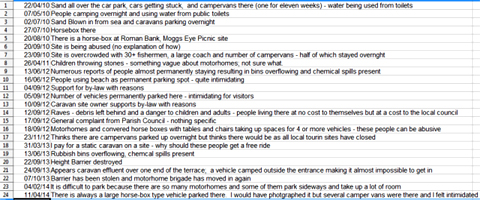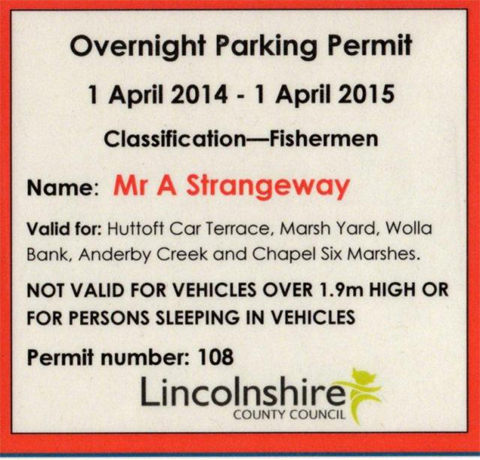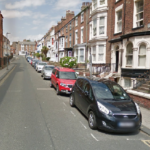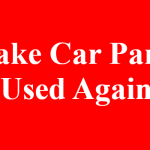Dear Editor,
As a campaigner with an interest in illegal restrictions on Overnight Parking I have previously successfully campaigned to have over 300 illegal “No Overnight Parking” road signs removed from across the Highlands in 2012. In Autumn 2013 I became aware of the questionable restrictions on Motor Caravans in the Scarborough Borough Council area. On the back of this I became interested in the restrictions on coastal car parks on the Lincolnshire coast north of Skegness.
Prior to my getting involved Lincolnshire County Council (LCC) had erected numerous height barriers with some being removed by persons unknown. Then LCC invented a problem that does not exist. Despite claims made to the BBC within the last two weeks of hundreds of complaints with regards the coastal car parks there are only 24.
On the basis of these 24 complaints LCC spent two years introducing a byelaw that should never have been signed off by the Department for Communities and Local Government (DCLG). LCC Principal Solicitor stated:
- “There are continuous problems – mainly throughout the warmer season – with people camping (with motor homes, etc) and parking overnight. This is having an impact on the residents in the area as they are being subjected to noise, nuisance, excessive litter, fires from campfires, and verbal abuse from some of the people camping”.
Did you see the jump?
Who says the stated issues are due to motorhomers? Fabrication. But this does not prevent LCC working closely with the DCLG to introduce a byelaw.
Lincolnshire Byelaw for Pleasure Grounds, Public Walks and Open Spaces
The LCC successfully introduced a byelaw to prevent overnight parking in numerous coastal car parks by using legislation that cannot be used for a car park. Furthermore, the Department for Communities and Local Government (DCLG) approved this byelaw. Based on this evidence, the DCLG could have signed off hundreds of byelaws in England that should not be in place.
This is a national scandal.
I am currently attempting to have my complaint against the DCLG dealt with as per their complaints procedure. This is not easy when the DCLG know they have failed. Their complaints procedure states you should raise your complaint with the person your complaint is about to give them the opportunity to address the complaint. Thus I contacted Paul Rowsell, the person who signed off the byelaw. One of his team responded.
- “The role of the DCLG in the confirmation of byelaws is twofold. It is firstly to ensure that the statutory process for bringing in byelaws into being has been followed, and secondly that the byelaws that a local authority is proposing to bring in are proportionate and reasonable to the issues causing concern. To fulfil this role the DCLG relies on the information provided by the Council in their application.”
- “By relying solely on the information provided by the council in their application the DCLG have failed in their role to ensure that the byelaws LCC proposed to bring in were proportionate and reasonable to the issues causing concern. Indeed the DCLG failed to establish if there was an issue beyond that stated by LCC as no independent evidence was provided.”
The DCLG provides a list of subjects which are covered by general legislation and which are not therefore judged to be suitable for byelaws. Numerous subjects on the list are fundamental to the reason for and the purpose of this byelaw these include:
- Camping
- Gypsies and travellers
- Language – violent, threatening or abusive
- Litter
- Public order
LCC, on the basis of this byelaw, have been saying for two weeks they have issued 40 summonses. Myself and all my supporters still await a summons. We will challenge every summons on various grounds.
Then there are the recently introduced fisherman’s permits, of which I own one, that allows overnight parking. Who is to say that one of the fishermen issued a permit is not subjecting local residents to “noise, nuisance, excessive litter, fires from campfires, and verbal abuse” ?
So why was the byelaw introduced to prevent parking overnight and the height barriers erected at a cost of £100,000 for LCC to then issue permits to park overnight? From my experience such action only happens within a short distance of a camp site, there are many camp sites in the area! Motorhomes do not require the services of a camp site on a daily basis.
The future of the UK motorhome industry is at risk due to these discriminatory and illegal practises of local authorities like LCC. This is an industry with current growth of 15% per annum. There are 215,000 motorhomes in the UK. The majority of these spend their holidays in Europe where they are welcomed. In addition motorhomers from France, Scandinavia, Germany, Italy etc do not visit the UK due to these policies. These policies are costing the UK tourism industry millions.
I am in no doubt that I can park a car, van or motorhome overnight at any of the coastal car parks including Huttoft Car Terrace and LCC will never be able to prosecute me.
I welcome their attempt to do so.
Regards,
Andy
Andy STRANGEWAY. Full Sutton. 25th June, 2014.






























Comments are closed.